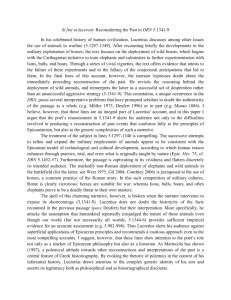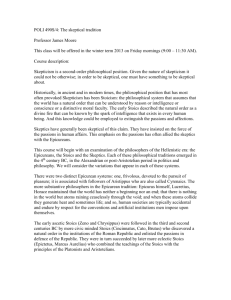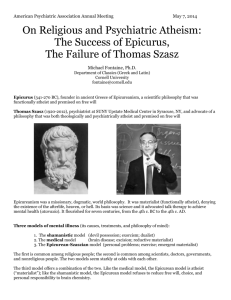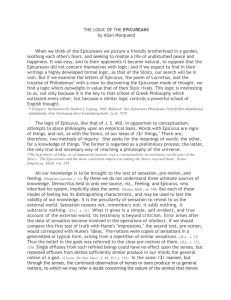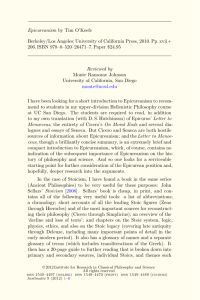Reconciling Justice and Pleasure in Epicurean
advertisement
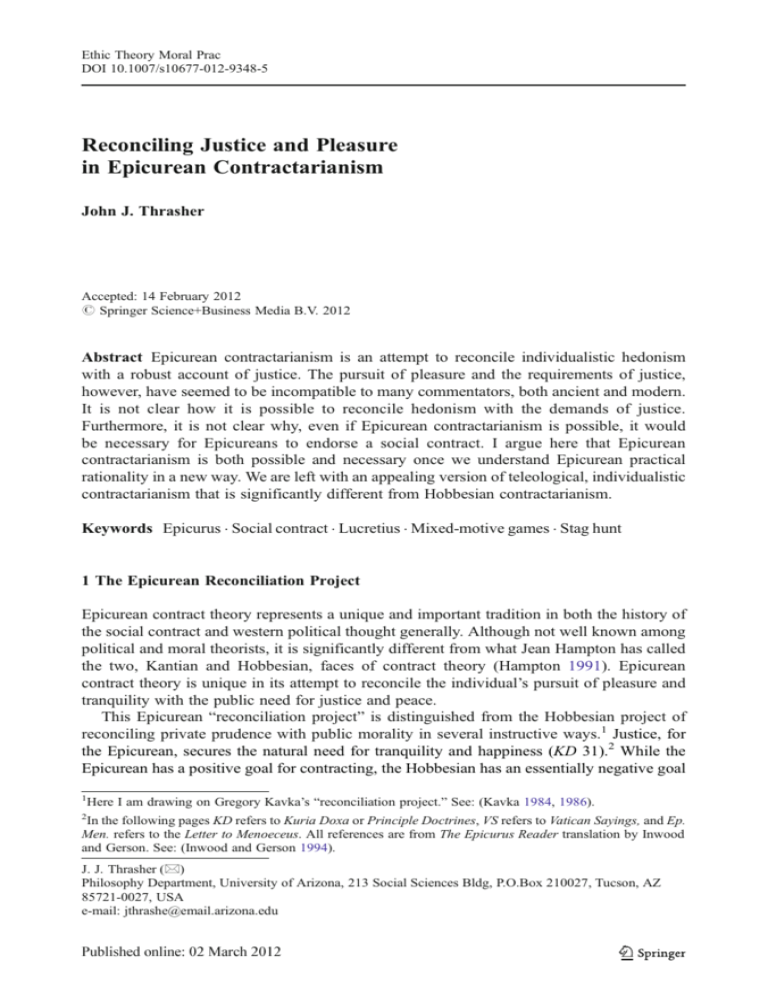
Ethic Theory Moral Prac
DOI 10.1007/s10677-012-9348-5
Reconciling Justice and Pleasure
in Epicurean Contractarianism
John J. Thrasher
Accepted: 14 February 2012
# Springer Science+Business Media B.V. 2012
Abstract Epicurean contractarianism is an attempt to reconcile individualistic hedonism
with a robust account of justice. The pursuit of pleasure and the requirements of justice,
however, have seemed to be incompatible to many commentators, both ancient and modern.
It is not clear how it is possible to reconcile hedonism with the demands of justice.
Furthermore, it is not clear why, even if Epicurean contractarianism is possible, it would
be necessary for Epicureans to endorse a social contract. I argue here that Epicurean
contractarianism is both possible and necessary once we understand Epicurean practical
rationality in a new way. We are left with an appealing version of teleological, individualistic
contractarianism that is significantly different from Hobbesian contractarianism.
Keywords Epicurus . Social contract . Lucretius . Mixed-motive games . Stag hunt
1 The Epicurean Reconciliation Project
Epicurean contract theory represents a unique and important tradition in both the history of
the social contract and western political thought generally. Although not well known among
political and moral theorists, it is significantly different from what Jean Hampton has called
the two, Kantian and Hobbesian, faces of contract theory (Hampton 1991). Epicurean
contract theory is unique in its attempt to reconcile the individual’s pursuit of pleasure and
tranquility with the public need for justice and peace.
This Epicurean “reconciliation project” is distinguished from the Hobbesian project of
reconciling private prudence with public morality in several instructive ways.1 Justice, for
the Epicurean, secures the natural need for tranquility and happiness (KD 31).2 While the
Epicurean has a positive goal for contracting, the Hobbesian has an essentially negative goal
1
Here I am drawing on Gregory Kavka’s “reconciliation project.” See: (Kavka 1984, 1986).
2
In the following pages KD refers to Kuria Doxa or Principle Doctrines, VS refers to Vatican Sayings, and Ep.
Men. refers to the Letter to Menoeceus. All references are from The Epicurus Reader translation by Inwood
and Gerson. See: (Inwood and Gerson 1994).
J. J. Thrasher (*)
Philosophy Department, University of Arizona, 213 Social Sciences Bldg, P.O.Box 210027, Tucson, AZ
85721-0027, USA
e-mail: jthrashe@email.arizona.edu
J.J. Thrasher
for entering contractual society. The Hobbesian sees the social contract as a way to end the
war of all against all in the state of nature (Hampton 1986, chap. 2). The Epicurean is
motivated to enter contractual society in order to secure happiness and cooperation, whereas
the Hobbesian seeks to avoid war. Furthermore, it is fear, particularly the fear of violent
death, which motivates the Hobbesian. Without this fear, the Hobbesian would not be
motivated to seek or maintain the social contract. The Epicurean, however, aims to eliminate
the fear of death in order to achieve tranquility and peace (Mitsis 1988, p. 67). These
differences make the Epicurean social contract distinct in interesting ways from its Hobbesian
cousin. Epicurean contractarianism is a non-Hobbesian teleological account of justice. Those
who are attracted to teleological theories of practical rationality and contractual theories of
justice will find Epicurean contractarianism appealing.
This version of contractarianism is also interesting because it was so unusual. Among the
major ancient philosophers, the idea of the social contract was often used as a example of a
“a pernicious error” to be attacked (Vlastos 1941, p. 291). Indeed, according to Gough,
“much of the political philosophy of Plato and Aristotle was designed to combat these
subversive opinions [of the social contract]” (Gough 1957, p. 13). Justice understood as a
contract concerned many ancient thinkers because, on this view, justice has a merely
instrumental value useful for securing individual benefits in social intercourse. If justice is
valued only because of the benefits it confers, what is to stop citizens from deserting justice
when its benefits outweigh its costs? Political society can never truly be secure on such
selfish, individualistic grounds, as many ancient thinkers argued. Epicureans, then, insofar as
they hold an instrumental conception of justice, can never be truly trustworthy members of
society; they can never be good citizens.3 Critics contend that Epicureanism is a countercultural and subversive political doctrine (Brown 2009, p. 180). This charge raises the
question of how an Epicurean can be a reliable member of political society. How is
hedonism compatible with justice, they wonder. The answer to both of these questions will
determine whether the Epicurean project of reconciling the pursuit of private pleasure with
public justice is possible.
The traditional answer to this question has been that attempting to build the bonds of civic
allegiance on a foundation of individualistic hedonism is hopeless. Commenting on Hobbes’s similar project, David Gauthier notes that “from unlimited individualism only anarchy
follows” (Gauthier 1969, p. vi). While I agree with Gauthier and other critics that the
Hobbesian reconciliation project has severe problems, I will argue here that the Epicurean
project to reconcile private benefit with public stability has promise. If I am right, the
Epicurean approach to contractual justice will provide a much needed alternative to the
traditional approaches to contract theory that come from Hobbes and Kant. These different
features of the Epicurean social contract will then not only interest classical scholars, but
also contemporary contract theorists who are concerned with using the social contract to
mediate between private and public reason. To that end, I aim to show here that the
Epicurean conception of the social contract is appealing on its own terms and of interest
to contemporary contract theorists.
To show that justice and pleasure can be reconciled is to show that the non-teleological
demands of justice are consistent with the teleological dictates of hedonistic practical
rationality. In §2, I argue that we should think of the Epicurean hedonic calculus as applying,
3
A similar question arises, for similar reasons, with regard to the Epicurean and friendship. This paper is not
directly concerned either with the possibility of Epicurean citizenship or friendship, except incidentally in §2.
For excellent recent work on the topic of the possibility and nature of Epicurean friendship see: (O’Keefe
2001a) and (Evans 2004).
Epicurean Contractarianism
at least some of the time, to rules rather than directly to actions or desires. Once we
understand Epicurean practical rationality as a kind of “rule-hedonism,” I argue in §3, it is
possible to show that contractual justice is consistent with Epicurean practical rationality.
Even if the social contract is possible, the question remains whether it is necessary. Do
Epicureans really need a social contract or is first-personal practical rationality enough for
tranquility? In §4 I argue that even a society of perfectly wise Epicureans would need public
rules of justice to preform coordinating, assuring, and specifying functions. I close by
arguing, in §5, that Epicurean contractarianism is not only possible and useful, but also
attractive.
2 Epicurean Practical Rationality
Showing that Epicurean teleological hedonism is consistent with the non-teleological
demands of justice is the key to the Epicurean reconciliation project. Epicurean practical
rationality is teleological in that all reasoning aims at the goal of ataraxia. The demands of
justice are non-teleological in that they are not justified by how well they help satisfy some
further aim. In this section, I argue that we need to understand Epicurean hedonism as
applying to rules rather than actions or desires for this reconciliation to work. First, I show
the general contours of Epicurean hedonism. Then I highlight some of the problems that
arise in relation to friendship, before arguing for a solution to these problems that I call “rulehedonism.”
Epicurean contractarianism, like all Epicurean thought, is the consequence of one fundamental motivational principle:
If you do not, on every occasion, refer each of your actions to the goal of nature, but
instead turn prematurely to some other [criterion] in avoiding or pursuing [things],
your actions will not be consistent with your reasoning (KD 25).
This goal of reasoning and action is the absence of pain and the tranquility that comes from
living without fear (KD 3).4 This kind of pleasure, ataraxia, is unhindered tranquility, rather
than a sensation of active pleasure.5 It is a psychological fact, according to Epicurus, that we
do actually seek ataraxia and that our lives go best, from a subjective point of view, when
we pursue ataraxia. It is the natural goal of beings like us. If fear of the gods, death, and pain
constitute sickness of the soul, removing those ailments constitutes its health. This psychological hedonism creates the justification for the normative hedonism that practical reasoning should aim at ataraxia.6 The normative ideal of Epicurean practical rationality is a
hedonistic form of instrumental rationality with the final end of ataraxia. In the parlance of
modern decision theory, it is a maximizing theory of rationality. Given a set of ordered
preferences, individuals chose rationally when they choose to act on their highest valued
goals. To choose less pleasure rather than more pleasure when given the choice is paradigmatically irrational and contrary to nature.
Given this conception of practical rationality and virtue, it is hard to see how one can
single-mindedly pursue pleasure and accept the constraints of justice. Traditionally, virtue
4
Throughout I will use the terms “ataraxia” “pleasure” “tranquility” and “happiness” as synonyms unless
noted otherwise.
5
Here I am following (Nikolsky 2001).
6
Again, there is some controversy on this point, but I find Nikolsky’s argument persuasive. See: (Nikolsky
2001).
J.J. Thrasher
ethical theories solve this problem by making the virtue of justice constitutive of happiness
with deontic restraints built into the formal conditions of happiness.7 To use the Rawlsian
terminology, the right flows naturally out of the good.8 This solution, however, will not work
for the Epicurean. Unlike in Aristotelian or Stoic virtue theory, the standard of Epicurean
happiness is not an objective, formal standard, but rather the subjective, psychological state
of ataraxia. The Epicurean has a reason to ϕ only if he or she believes that ϕ-ing will
reliably lead to the final end of ataraxia. If all reasons are instrumental in this sense, how is it
possible for the Epicurean to have reason to constrain his or her pursuit of the goal of nature
by the deontic demands of justice? To give a plausible account of justice, the Epicurean
needs to explain how to justify the demands of justice as a means to the final end of ataraxia.
One version of this problem arises in the context of friendship. Epicurus claims “…every
friendship is worth choosing for its own sake, though it takes its origin from the benefits it
confers on us” (VS 23). Given this statement about the value of friendship and KD 25, how
can friendship be non-instrumentally valuable while also being beneficial because of the
benefit it confers? Some have argued that genuine friendship is impossible unless we amend
the basic egoistic element of Epicurean practical rationality.9 In contrast, Matt Evans argues
that there are two basic approaches to understanding friendship in a consistently egoistic
way (Evans 2004, 413). Friendship as “indirect egoism” involves incorporating the good of
a friend or of friendship generally into one’s own good. This is the interpretation that
Timothy O’Keefe favors (O’Keefe 2001a). The alternative is Evans’s preferred view, “direct
egoism,” that one’s own good “stands or falls” with the good of one’s friend (Evans 2004,
413). Indirect egoism is, for O’Keefe, a two-level hedonistic theory. Choice of desires is
governed directly by hedonic concerns and those desires then pick out particular actions,
which are only indirectly related to the original hedonic calculus (O’Keefe 2001a, 300–302).
In contrast, Evans’s direct egoism applies the hedonic calculus to action selection. Evans
maintains that Epicureans can “reason their way to friendship” through direct egoistic means
(Evans 2004, 423). What is true of friendship will likely be true of justice so it is imperative
to determine whether the Epicurean hedonic calculus is meant to apply to actions (direct
egoism), desires (indirect egoism), or something else entirely.
The direct egoist interpretation has the benefit of being the easiest to reconcile with KD
25. The indirect egoist interpretation makes it easier to understand how the Epicurean can
incorporate friendship and justice into hedonism. Another possibility, between direct and
indirect egoism, is what Gregory Kavka calls “rule egoism” (Kavka 1986, chap. 9).
Although Kavka developed his version of rule egoism in the context of understanding
Hobbes’s ethical theory, there are enough similarities between the two accounts for a
plausible Epicurean version as well. The hedonic calculus applies directly to rules rather
than to desires or action. Furthermore, rules can be generalizations over desires or actions, e.
g. “don’t cultivate a desire for riches” or “seek out friends.” The first is a rule that indicates
what desires will lead to pleasure whereas the second is a rule that indicates a particular set
of actions that will likely lead to pleasure, namely having friends.
Rule egoism has several benefits over direct and indirect egoism. First, it is more general.
Both actions and desires are mentioned throughout KD and VS as the possible object of
choice. Rule egoism recognizes the importance of both actions and desires to the end of
ataraxia and accounts for both in terms of rules. Second, rule egoism is simpler and likely
7
For an interesting and sophisticated recent treatment of this problem, see: (LeBar 2009).
Of course, it is easy to overstate this point. Julia Annas cautions against contrasting too sharply between the
ancients and the moderns on this point. See: (Annas 1993, chap. 13).
9
See, for instance (Mitsis 1988, 98–128) and (Annas 1993, 236–244).
8
Epicurean Contractarianism
more reliable than direct or indirect egoism. It is reasonable to expect that the typical
Epicurean would be bewildered in the face of the multiplicity and complexity of choices
that would face him or her on any given day. The stress of deliberating over actions on the
direct egoist interpretation of KD 25 would often create anxiety rather than tranquility.
Similarly, it is not clear that, given the complexity of the world, the direct approach would
reliably lead to ataraxia. The indirect approach is not better on this count partly because
desires do not necessarily pick out unique action in decision situations, partly because the
indirect egoist faces the same problem as the direct egoist at the level of desires. By using
rules, however, the Epicurean can rely on the knowledge embodied in the rules without
having to deliberate in each case.
This explains the reason that Epicurus spends so much time in his writing listing rules and
maxims. He gives rules about how to reduce sexual passion (VS 18), the irrationality of
suicide (VS 38), the danger of envy (VS 53), and the dangers of great wealth (VS 67). In all of
these cases, and many more, Epicurus is passing on wisdom about how to reliably achieve
ataraxia. He is playing the part, of a guide who has walked down life’s tangled road and is
reporting to those who have yet to see everything he has seen. These maxims or rules are the
embodiment of the successful use of practical rationality in the past. Following these types
of rules is, therefore, an application of direct egoism in an indirect way. Given the limited
cognitive capacity and time of the Epicurean rational agent, relying on rules as a guide can
be, following Gigerenzer and Goldstein, a “fast and frugal” way of reasoning based on
heuristics communicated as rules or maxims (Gigerenzer and Goldstein 1996). Instead of
choosing over the expected outcome of individual acts, the rule egoist chooses sets of rules
to follow based on the expected outcome of following that rule or set of rules (Kavka 1986,
358–359). In the next section we will see how understanding Epicurean practical rationality as
“rule-hedonism” makes it possible to reconcile Epicurean practical rationality with justice.
3 The Possibility of the Contract
Once we understand Epicurean practical rationality as applying to rules rather than to
particular actions or desires, we can see how the Epicurean can reconcile the imperatives
of practical rationality with the demands of justice. A particular social contract is a set of
rules that regulates behavior in certain public settings. The Epicurean agrees to a particular
set of rules in order to more reliably achieve and maintain personal ataraxia. We might
wonder, however, why the Epicurean would need a contract at all. Why wouldn’t the firstpersonal application of practical rationality be sufficient for ataraxia? Why is the social
contract necessary? In a world of practically rational Epicureans, the social contract seems
either otiose or harmful. Either the contract recommends what practical rationality would
recommend or it conflicts with practical rationality. On its face, Epicurean contractarianism
looks either unnecessary or impossible. I will argue here that the Epicurean social contract is
both necessary and possible. The social contract is necessary, as I will argue in the next
section, for its coordinating, assuring, and specifying functions. The social contract is
possible because of the role that rules can play in Epicurean practical rationality. In this
section I will argue that the Epicurean social contract is consistent with Epicurean practical
rationality and, hence, possible, while fulfilling an important social role.
The Epicurean social contract is fundamentally instrumental; it is a “pledge of reciprocal
usefulness neither to harm one another nor be harmed” (KD 35). To be consistent with
Epicurean practical rationality, then, the contract must secure benefits that would not be
possible without the contract. If, however, one only has reason to enter into a contract
J.J. Thrasher
because of the benefits, what reason does one have to follow the contract when there are no
benefits and only costs? This is the heart of the concern that the Epicurean cannot be a good
citizen. If citizenship involves the possibility of sacrifice, why should we expect the
Epicurean to comply? Here again, we see the same kind of problem that we saw in §2
concerning friendship; the solution is also similar.
A conflict between practical rationality and the requirements of justice arises when the
connection between the rules of justice and individual benefit come apart. If someone is
convinced that he or she will be able to avoid detection, there is no reason, one might fear,
not to commit injustice. When benefit and justice conflict, so much the worse for justice. To
solve this problem, we need to show that the rules of justice are an integral part of practical
rationality and so the rules of justice will not conflict with practical rationality, rightly
understood.
To see how this integration is possible consider a case from Book II of De Finibus.10 Cicero
challenges Torquatus with two situations where acts of injustice lead to substantial benefits. In one
case, a man leaves his estate to his friend in trust for his daughter. Once the man is dead, his friend
lacks a prudential reason for keeping his word to hold the estate in trust (De Fin, II 58). In a
second case, Cicero supposes an Epicurean knows “…that a viper is lurking somewhere, and that
someone whose death would benefit you is about to sit down on it unawares” (De Fin, II 59). If no
one is around, it is hard to see why the Epicurean would warn the person about the snake. The
question is whether the Epicurean, in cases like these, will be reliably just.
Torquatus argues that the Epicurean would naturally feel guilty after doing wrong and,
hence, would avoid doing it in the first place. Knowing their own psychological make-up, the
Epicurean will avoid acting unjustly so as to avoid the guilt, remorse, stress, and other negative
emotions that come from hurting others and acting unjustly. Cicero, unconvinced, replies that
when dealing with a “sly fox” without remorse, this response will be impotent. The Epicurean,
according to Cicero, is begging the question by claiming that there will never be any temptation
to behave improperly in the first place. In effect, the Epicurean is denying that benefit and
justice can ever conflict. Similarly, the Epicurean might also reply, as Torquatus does in Book I
that, “however secret the deed, there is never a guarantee that it will remain secret” (De Fin, I
50). This is also presumably true, but it seems to miss something important in the Ciceronian
challenge. Cicero is arguing that there are at least some cases where benefit and justice will
recommend different actions, since Epicurean practical rationality is based on benefit, to act
justly in cases where justice conflicts with benefit is to act irrationally.
The Epicurean, however, can respond to these concerns once we understand the role of
rules in Epicurean practical rationality. We saw in §2 that rule following is often more
reliable than individual action evaluation in achieving pleasure. Rules constrain the teleological pursuit of the good, but only as a means of more reliably achieving more good. The
Epicurean is trying to optimize on ataraxia given the constraints of justice, just as a rational
economizer in the market will try to optimize on value given the hard budget constraints they
may have.11 In the same way that a budget constraint for a household will rule out some
valuable purchases, over time it will ensure the solvency of the household. Justice, to the
rational Epicurean, is similar; it restricts individual choices in the short-run, but increases the
reliability of achieving pleasure in the long-run. Justice constrains action at the local level as
10
All references to De Finibus are from the 2001 edition edited by Julia Annas and translated by Raphael
Woolf. See: (Cicero 2001).
11
The obvious analogy is to linear programming and maximization given constraint, where the constraint here
is the contractarian rules of justice. For an example how constraints are applied to practical rationality that is
similar to the account offered here, see: (Schmidtz 1992).
Epicurean Contractarianism
a means to global ataraxia optimization. Rules play this role in the Epicurean conception of
justice by specifying publicly stable and recognized action directives.
Following the contractual rules of justice is also a prudent strategy for those, like the Epicurean,
who are primarily concerned with tranquility. Epicurus writes that, “the just life is most free from
disturbance, but the unjust life is full of the greatest disturbance” (KD 17). Epicurus is arguing that
following the rules of justice is a key component of the tranquil life. No one who disobeys the
rules of justice can be certain that they will be able to avoid detection from their wrongdoing. This
uncertainty causes anxiety. Anxiety is the opposite of tranquility. This is much the same response
that Hume gives to the sensible knave when he admits that someone who is not disposed to follow
the rules of justice cannot be easily convinced of their worth, but that those who are disposed to act
justly open themselves to “…inward peace of mind” (EPM, 9.22).12 The wise Epicurean will not
gamble on the probability of getting away with injustice in each act but will follow the rules of
justice instead. Wisdom is the unwillingness to gamble in these situations.
Once we see that justice can be part of a means to the end of globally optimizing on ataraxia,
it is worth taking another look at earlier challenges raised by Cicero. The Lydian shepherd, with
the Ring of Gyges, has the ability to commit any crime without fear of reprisal. This power to
commit injustice without the fear of reprisal makes the shepherd “an equal to a god among
humans” (Republic, 360c).13Glaucon wants Socrates to demonstrate that even the Lydian
shepherd has reason to be just, but Glaucon is surely asking for the impossible. As both
Epicurus and Hume suggest, there can be no justice between gods and mortals or humans
and animals (KD 32). Justice is a relationship between relative equals (EPM, 3.18-21). Hume
suggests that if there were a species so weak that they could never hope to harm us, we would
not be able to treat them justly (EPM, 3.18). Once the shepherd has the Ring, he is no longer in
the circumstances of justice with his fellows. 14 In these types of cases, the rules of justice do not
reliably lead to ataraxia. The Epicurean realizes, however, that the actual world has a conspicuous lack of all-powerful magical rings. We do exist, for the most part, in the circumstances of
justice and, hence, the rules of justice do tend to be reliable tools. Our fellows are roughly as
powerful and frail as we are. As David Gauthier puts it, “human beings live, and must live, in
the circumstances of justice” (Gauthier 1982, p. 27). Hobbes was right to think that however
unequal humans may be in many respects, we are still roughly equal in the ability to harm one
another (Leviathan, chap. 15).15 This means that whatever incidental asymmetries of power and
resources that may arise, the circumstances of justice will remain.
In our world of approximate equality, Epicureans will have prudential reason to abide by
the rules of justice as a means to ataraxia. The pursuit of the good is rationally constrained
by principles of right so that one may more reliably achieve tranquility.16 By making the
12
EPM is an abbreviation for The Enquiry Concerning the Principles of Morals. All citations are from the
1998 edition edited by Tom Beauchamp, see: (Hume 1998).
13
All references to The Republic are from Bloom’s 1968 translation. See: (Plato 1968).
14
Epicurus is unequivocal that justice is useful and that the purpose of justice is mutual, reciprocal benefit
(KD 31).
15
References from Leviathan are from the 1996 Cambridge Revised Student Edition edited by Richard Tuck.
See: (Hobbes 1996)
16
There are obvious similarities between my account and the account in (Vander Waerdt 1987, p.408–411).
One main difference, though, is that I am dealing with the question of whether it is rational to follow the rules
of justice in the normal, everyday case. That is, whether it can ever be rational to abide by the rules of justice
when they conflict with what practical rationality would recommend if the case were judged on its own,
without relation to the rules. Vander Waerdt is concerned primarily with the question of whether there are
cases where the Epicurean will be required by practical rationality to disobey the rules of justice. Some of the
replies here to Cicero and Glaucon will apply to this question, though a full response would require more
work.
J.J. Thrasher
rules of justice an essential component of the prudent pursuit of ataraxia, we can see how it
is possible for an Epicurean to be both practically rational and committed to the rules of
justice. As a modern proponent of this kind of view argued, “duty overrides advantage, but
the acceptance of duty is truly advantageous” (Gauthier 1986, p. 2). Naturally, this is only
true if the rules of justice really do reliably lead to security and tranquility. The act of merely
contracting, however, is not enough to ensure this. As Eric Brown notes, “Epicurus
recognizes limitations on the substance of the convention,” namely that the rules of justice
actually do guarantee reciprocal usefulness and protection from harm (Brown 2009, p. 195).
Brown also notes that the efficacy of the rules of justice will lead to different rules being
acceptable in different times and places. Epicurus can provide a justificatory test of the rules
of justice, that they are reciprocally useful and provide protection, but he cannot specify
exact rules of justice that will be stable across different societies and different ages. This is
how it should be. One of the key lessons we learn from modern, evolutionary minded
theorists of justice is that effective social norms and rules will vary depending on the
circumstances of the time and place.17 Once we see that Epicurean contractarianism can
be consistent with Epicurean practical rationality, that is, once we see that justice can be
instrumentally valuable to the pursuit of ataraxia, the individual Epicurean will have a selfinterested reason to obey the constraints of justice.
The Epicurean social contract, then, is possible. The question remains, however, why
Epicureans need a social contract. If justice is consistent with practical rationality, firstpersonal practical rationality should be enough. To see why the Epicurean social contract is
both possible and necessary we need to look at the specifically social role that the contract
plays in coordinating and assuring members of society.
4 The Necessity of the Contract
The question of this section is why justice must be the result of a social compact and not
merely part of the successful application of first-personal practical rationality, why justice,
for the Epicurean, must be a social rather than a merely personal virtue. I will argue that the
social contract is necessary for three reasons: 1) it coordinates actions between members of a
society 2) it helps create assurance that everyone in the society will follow the rules of justice
3) it specifies those rules to avoid ambiguity. These are the coordination, assurance, and
specification functions of the social contract, respectively. None of these social functions can
be accomplished by the separate, individual use of practical rationality.
The problem that the Epicurean social contract solves is not the same problem that the
Hobbesian contract seeks to solve. The problem in Hobbes’s state of nature is that natural
equality leads to everyone believing that they can trample over others to achieve their ends
(Leviathan, chap. 13). They overestimate their strengths as well as the benefits of conflict,
while underestimating their weaknesses and the costs of conflict. Strife is the norm. The
Epicurean contractor is not motivated by a desire to overpower or avoid others, but rather is
driven by a desire to seek the means of mutual accommodation to avoid conflict in order to
live blessedly. As we saw in §2 and §3, the Epicurean sees the rules of justice as a reliable
way to secure tranquility. The rational Epicurean, however, will recognize that even if the
social world is not necessarily characterized by strife in the way that Hobbes thinks, it is still
characterized by confusion and misunderstanding. People would rather cooperate than fight,
17
For a sophisticated recent attempt to deal with this problem, see: (Vanderschraaf 2010). Epicurus also
makes this point in KD 36.
Epicurean Contractarianism
Table 1 Prisoner's dilemma
Prisoner 2
Prisoner 1
Not confess
Confess
Not Confess
II, II
IV, I
Confess
I, IV
III, III
but if they are unsure, what others will do or unsure what the rules are, they will be afraid to
cooperate. Furthermore, when disputes arise, there needs to be an impartial means to resolve
disputes. Otherwise, the gains that might have come from cooperating and living with
others, the benefits of commerce as well as friendship, will be lost.
Understood this way, we should model the Epicurean social contract as an assurance
game. This type of strategic interaction models a social condition whereby individuals would
most like to be able to coordinate and cooperate but are unsure how to do so and whether
others will also cooperate. In contrast, the Hobbesian state of nature is a “mixed-motive
game” like a prisoner’s dilemma. In a mixed motive game, everyone will benefit from
cooperation, but each person will also be tempted to defect from cooperation, universal
defection, therefore, will be the dominant strategy.18 One version of a mixed-motive game,
the prisoner’s dilemma, is represented in Table 1 with Roman numerals representing each
prisoner’s preference ranking (I is preferred to II and so on).
In a two-person prisoner’s dilemma, both prisoners are better off if they cooperate and do
not confess. This solution is not stable, however. Each is better if they confess while the
other stays silent. If they both reason this way, as they will if they are rational, they will be
both led to the {confess, confess} equilibrium, which is stable. The moral of the mixedmotive game is a tragic one. In this case, the exercise of individual practical rationality leads
to an outcome that either party would have preferred to avoid. The only way to make
cooperation rational in a prisoner’s dilemma is to transform each player’s payoffs in the
game and thereby to transform the prisoner’s dilemma into some other game where
cooperation can be rational.19 The only way to win in a prisoner’s dilemma, in short, is
not to play at all. The question becomes, then, how to transform mixed-motive games where
cooperation is difficult or impossible into coordination games where cooperation is possible
and beneficial. The Epicurean social contract makes cooperation between practically rational
agents possible and stable by transforming mixed-motive games into coordination games. To
see how this process works, though, we need have a basic understanding of assurance
games.20
Unlike mixed-motive games, assurance games typically involve multiple equilibria. In
some cases, one equilibria is more beneficial (payoff-dominant), while the other is less risky
(risk-dominant). The classic example is the stag hunt. In a stag hunt, players can chose to
either hunt hare or stag. If both decide to hunt stag, they both benefit the most. If one decides
to hunt stag and the other decides to hunt hare, the hare hunter gains and the stag hunter gets
nothing because it takes two people to effectively hunt stag. One version of this game is
represented in Table 2 again with ordinal pay-offs represented by Roman numerals.
18
For a canonical description of the prisoner’s dilemma see: (Luce and Raiffa 1957, §5.4).
This is a point that informs much of Cristina Bicchieri’s recent work on social norms. See: (Bicchieri 2006,
chap. 1).
20
An assurance game is a kind of impure coordination game. On the assurance problem, see: (Sen 1967) and
(Baier 1995, chap. 5).
19
J.J. Thrasher
Table 2 Stag hunt
Hunter B
Hunt stag
Hunter A
Hunt hare
Hunt stag
I, I
III, II
Hunt hare
II, III
II, II
The game has two pure equilibria: both hunt stag and both hunt hare. The problem is that
the players will only hunt stag only if they trust that the other player will hunt stag, otherwise
they will hunt hare. The problem that the Epicurean social contract solves is a stag hunt not a
prisoner’s dilemma. On this point I agree with Mitsis (Mitsis 1988, p. 81–82) that Denyer
and Bailey are mistaken when they model the Epicurean contract as a solution to a prisoner’s
dilemma (Denyer 1983; Bailey 1928). I have already shown why this is the case in §2 and
§3. Epicureans see effective rules of justice as a reliable means to ataraxia. A world where
the Epicurean can be secure in the knowledge that they neither will harm nor be harmed by
others is the most tranquil and prosperous kind of world (KD 33).
We are now in a position to see why the social contract is necessary to ensure mutual
safety and cooperation. If the state of nature is a stag hunt, the problem is how to move from
the risk-dominant equilibrium {hare, hare} to the payoff-dominant equilibrium {stag, stag}
(Skyrms 2004, p. 9–13). Unless there is assurance that everyone else will hunt stag, each
player will take the less risky strategy and hunt hare. If everyone hunts hare, however,
society will be worse off than it might have been. The key to solving this problem is to
develop a means to reliably indicate that everyone is planning to hunt stag rather than hare.
As many recent thinkers have suggested in their different ways, the social contract understood as a set of norms or rules can be mechanisms for creating the public, social assurance
that is necessary for mutual cooperation (Skyrms 2004; Bicchieri 2006; Binmore 2005;
Smith 2008; Gintis 2009; Gaus 2011). These rules and norms make social coordination
possible by facilitating mutual gain from cooperation. The mere presence of a suitably
enforced contract can create the conditions that allow for justice and mutual benefit.21
Epicurean contractors can help to solve the mutual assurance problem by making clear,
reasonable rules of justice that both Epicureans and non-Epicureans will have reason to
follow because of the benefits that these rules secure. By contracting with one and other,
Epicureans can make it possible for non-Epicureans to join the contract by fixing norms and
making a public commitment to mutual assurance. There is still, however, an important role
for punishment to play in stabilizing the social contract. While non-Epicureans will, no
doubt, see the benefits of cooperating with the Epicureans along contractual lines, given the
imperfections in their practical reasoning, they will still likely be tempted to cheat and
disobey the rules of justice when they can get away with it. Punishment can help deter nonEpicureans from breaking the rules by increasing the cost and decreasing the benefit of
cheating. Epicurus makes this point himself in KD 34. Punishment can stabilize the social
contract and preserve cooperation (Boyd and Richerson 2005).
A suitably enforced set of rules is not only necessary to prevent cheating by nonEpicureans, however. Consider, for instance, the case of a society made up of wise
21
Herbert Gintis gives a different, though similar method of using social norms to solve mixed-motive and
coordination games that involves transforming the original game into a super-game with another player, the
choreographer, who makes a move before all of the other players. See: (Gintis 2010).
Epicurean Contractarianism
Epicureans.22 Even in that kind of society, the social contract would be necessary.23
Epistemic and factual differences will lead each person to pursue different goals in
different ways. Their conceptions of how to attain ataraxia as a practical matter will
not be identical. Even when two parties have the same motivation or the same ends,
each party needs to believe that the other party will actually do their part when their
time comes (Skyrms 2001, p. 32–33). One way to create this belief is to explicitly
contract and to create enforcement mechanism that ensure everyone will do his or her
duty. This is essentially the Hobbesian solution, to use punishment to secure compliance. The problem with this, from the Epicurean point of view, is that a sovereign
powerful enough to protect and enforce compliance through punishment is also
powerful enough to oppress. In addition to the previous problems of coordination,
assurance, and specification, this solution creates the new problem of how to ensure
protection from the sovereign. The main reason that Hobbes needs such a strong
sovereign is that the Hobbesian state of nature is a prisoner’s dilemma. As I have
argued, however, that is not the situation in the world as conceived by the Epicureans.
The problem that the social contract solves, for the Epicurean, is an assurance
problem, not a mixed-motive problem. The role of the social contract then is to
facilitate coordination and cooperation by specifying the rules of justice in a way that
can lead to mutual assurance.
We get a picture of how the creation of an Epicurean social contract consisting of social
rules and norms could arise in Lucretius’s description of the evolution of the social contract
In Book V of De Rerum Natura.24 There, Lucretius describes a natural state where, “each
had to fight against all in an endless struggle for food, water, and minimal comfort” (DRN,
V.839-840) and in the night men and beasts would prey upon one another while the weak
cowered in fear. This is the mixed-motive nightmare of the Hobbesian state of nature.
Eventually, though, men and women devise lodgings and begin to marry (DRN, V.878-885).
Families band together to hunt more effectively and to protect their women and children while
they are hunting (DRN, V.889-900). At this point, we can already see the basis of the
transformation from the mixed-motive situation to a state of nature where assurance is the
primary problem. It is the desire for companionship and family as well as the benefits of social
hunting that transforms the mixed-motive problem into an assurance problem. Unlike the
Hobbesian state of nature, which is full of fear and envy, this state of nature is characterized
by the Epicurean desire for friendship and mutual benefit.
Once we understand the problem that the social contract solves as an assurance problem
rather than a mixed-motive problem, we can clearly see why the Epicurean social contract is
necessary. It is necessary because it fulfills the coordinating, assuring, and specification
functions important to creating a stable general commitment to coordinate on the pay-off
dominant rather than the risk-dominant equilibrium. Only a public, social contract can
preform this function. The individual use of practical rationality would not be able to fulfill
these coordinating, assuring, and specifying functions.
22
For more on the important coordinating function of justice in Epicurean contractarianism which parallels
many of the arguments made here in a different way, see: (O’Keefe 2001b).
23
My discussion on this point shares some similarities with a theme of Gregory Kavka’s work. The general
idea that he and I both share is that, in his words, “…interpersonal conflicts…are not—as is often thought—
simply a result of the immorality of the parties involved. Rather, they are at least partly the result of
independent parties pursuing morally legitimate aims in a situation whose structure leads them into conflict”
(Kavka 1995, p. 18).
24
All excerpts from Lucretius taken from the 2008 Slavitt translation of De Rerum Natura, see: (Lucretius
2008).
J.J. Thrasher
5 Epicurean Contractarianism
Like many modern contractarians who followed him, Epicurus recognized that justice is
necessary and desirable because of the benefits it brings and for no other reason. The social
contract is the embodiment of justice as mutual benefit. The question for the Epicurean, the
question that we began with, is whether the conception of justice as mutual benefit is
compatible with Epicurean hedonism. Is it possible to reconcile justice and pleasure?
I have argued that the social contract is the means of reconciling justice and pleasure. For this
to be a plausible strategy, however, required answering three basic questions. First, how is it
possible for the Epicurean practical rationality to be governed by rules? Second, if the first
question was answered, how is the social contract possible given that justice may require
individuals to sacrifice some pleasure in order to maintain the rules of justice? Third, even if the
social contract is possible, why is it necessary from an Epicurean point of view? I answered the
first question in §2 by arguing that Epicurean practical rationality is a form of “rule hedonism.”
Epicureans apply the hedonic calculus, at least some of the time, to rules rather than to actions or
desires. Once we recognize that Epicureans are rule followers, it is a simple next step to show
that it is possible for them to follow rules of justice, even when individual applications of those
rules might be costly. In §3, I argued that Epicurean practical rationality, understood as rulehedonism, is consistent with the demands of justice and that Epicureans can be reliably
expected to abide by the demands of justice. Even if it is possible for Epicureans to follow
the rules of justice, it is still an open question of whether those rules are actually necessary. That
is, does the social contract fulfill an important function that the individual use of practical
rationality cannot fulfill? In §4, I argued that a social contract is necessary because of the
coordinating, assuring, and specifying role that it plays.
Once we see that the Epicurean social contract is both possible and necessary, given the
starting point of Epicurean practical rationality, we are left with the further question of whether
this particular reconciliation of justice and pleasure is appealing. I will conclude with this
question. The ultimate motivation for Epicurean contractarian is knowledge that life is fleeting.
As Epicurus writes, “We are born only once, and we cannot be born twice; and one must for all
eternity exist no more. You are not in control of tomorrow and yet you delay your opportunity to
rejoice” (VS 14). Too much of history is the chronicle of lives destroyed and wasted in pursuits
that enriched one life at the expense of another. The Epicurean vision of the just and good
society is one where people are secure to freely pursue the ends they find valuable and to enjoy
what little of life one has left without pain and fear and in the company of friends. The business
of justice is to allow us to get on with the, all too short, business of living. As Hume wrote in his
essay “The Epicurean” the motivating idea of this approach is the recognition of the frailty and
the ephemeral nature of our own existence. Hume writes:
if life be frail, if youth be transitory, we should well employ the present moment, and
lose no part of so perishable an existence. Yet a little moment and these shall be no
more. We shall be, as if we had never been. Not a memory of us be left upon earth; and
even the fabulous shades below will not afford us a habitation. Our fruitless anxieties,
our vain projects, our uncertain speculations shall all be swallowed up and lost. Our
present doubts, concerning the original cause of all things, must never, alas! be
resolved. This alone we may be certain of, that, if any governing mind preside, he
must be pleased to see us fulfill the ends of our being, and enjoy that pleasure, for
which alone we were created (Hume 1985/1742, Essay XV “The Epicurean”).
Epicurean justice is an attempt to give an account of the rules that govern our interaction so
that we may “enjoy that pleasure, for which we are alone created.” If one finds this
Epicurean Contractarianism
conception of the good society and the good life compelling, one will also find this kind of
contractarian approach to justice appealing. Regardless, the real value and novelty of his
theory is that he took the need to justify constraints on the individual pursuit of the good
seriously. It is for that reason that his theory is still worthy of serious study.
Acknowledgements The author wishes to thank Julia Annas, Chris Freiman, Jerry Gaus, Keith Hankins,
Mark LeBar, Brennan McDavid, Dan Russell, David Schmidtz, Kevin Vallier, and two anonymous reviewers
for their helpful comments and discussion on earlier versions of this paper. The author also would like to thank
the Center for the Philosophy of Freedom at the University of Arizona for its generous support during the
writing of this paper.
References
Annas J (1993) The morality of happiness. Oxford University Press, New York
Baier K (1995) The rational and the moral order: the social roots of reason and morality. Open Court
Publishing Company
Bailey C (1928) The Greek atomists and Epicurus: a study. Clarendon, Oxford
Bicchieri C (2006) The grammar of society: the nature and dynamics of social norms. Cambridge University
Press
Binmore K (2005) Natural justice. Oxford University Press, New York
Boyd R, Richerson PJ (2005) Punishment allows the evolution of cooperation (or anything else) in sizable
groups. The origin and evolution of cultures. Oxford University Press, pp 166–188
Brown E (2009) Politics and society. Cambridge Companion to Epicureanism
Cicero MT (2001) On moral ends. Edited by Julia Annas and Translated by Raphael Woolf. Cambridge
University Press
Denyer N (1983) The origins of justice. In: Macchiaroli G (ed) Syzetisis: studi sull’Epicureismo Greco e
Romano offerti a Marcello Gigante. Naples, pp 133–152
Evans M (2004) Can epicureans be friends? Anc Philos 24:407–424
Gaus G (2011) The order of public reason: a theory of freedom and morality in a diverse and bounded world.
Cambridge University Press
Gauthier D (1969) The logic of leviathan: the moral and political theory of Thomas Hobbes. Oxford
University Press, Oxford
Gauthier D (1982) Three against justice: the foole, the sensible knave, and the Lydian shepherd. Midwest Stud
Philos 7:11–29
Gauthier D (1986) Morals by agreement. Clarendon, Oxford
Gigerenzer G, Goldstein DG (1996) Reasoning the fast and frugal way: models of bounded rationality.
Psychol Rev 103:650–669
Gintis H (2009) The bounds of reason: game theory and the unification of the behavioral sciences. Princeton
University Press
Gintis H (2010) Social norms as choreography. Polit Philos Econ 9:251–264
Gough JW (1957) The social contract: a critical study of its development, 2nd ed. Oxford University Press
Hampton J (1986) Hobbes and the social contract tradition. Cambridge University Press
Hampton J (1991) Two faces of Contractarian thought. In: Vallentyne P (ed) Contractarianism and rational
choice: essays on David Gauthier’s morals by agreement. Cambridge University Press, Cambridge, pp
31–55
Hobbes T (1996) Leviathan. Revised student edition. Cambridge University Press
Hume D (1985) Essays: moral, political, and literary, revised. Liberty Fund Inc
Hume D (1998) An enquiry concerning the principles of morals. Oxford University Press
Inwood B, Gerson LP (1994) The Epicurus reader: selected writings and testimonia. Hackett Publishing
Company
Kavka GS (1984) The reconciliation project. In: Copp D, Zimmerman D (eds) Morality, reason and truth: new
essays on the foundations of ethics. Rowman & Allanheld, pp 297–320
Kavka GS (1986) Hobbesian moral and political theory. Princeton University Press
Kavka GS (1995) Why even morally perfect people would need government. Soc Philos Pol 12:1–18
LeBar M (2009) Virtue ethics and deontic constraints. Ethics 119:642–671
Luce RD, Raiffa H (1957) Games and decisions: introduction and critical survey. Wiley, New York
J.J. Thrasher
Lucretius (2008) De Rerum Natura: a poetic translation. Translated by David Slavitt. University of California
Press
Mitsis P (1988) Epicurus’ ethical theory: the pleasures of invulnerability. Cornell University Press
Nikolsky B (2001) Epicurus on pleasure. Phronesis 46:440–465
O’Keefe T (2001a) Is epicurean friendship altruistic? Apeiron J Anc Philos Sci 34:269–305
O’Keefe T (2001b) Would a community of wise epicureans be just? Anc Philos 21:133–146
Plato (1968) The Republic of Plato. Translated by Allan Bloom. Basic Books
Schmidtz D (1992) Rationality within reason. J Philos 89:445–466
Sen AK (1967) Isolation, assurance and the social rate of discount. Q J Econ 81:112–124
Skyrms B (2001) The stag hunt. Proc Address Am Phil Assoc 75:31–41
Skyrms B (2004) The stag hunt and the evolution of social structure. Cambridge University Press
Smith V (2008) Rationality in economics: constructivist and ecological forms. Cambridge University Press,
Cambridge
Vander Waerdt PA (1987) The justice of the epicurean wise man. Class Q 37:402–422
Vanderschraaf P (2010) The invisible foole. Philos Stud 147:37–58
Vlastos G (1941) Slavery in Plato’s thought. Philos Rev 50:289–304
